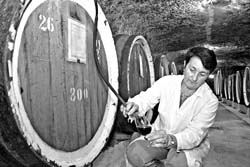Virtual re-export
Unfair competitors trip up Transcarpathian winemakers
Ukraine’s Ministry of Agricultural Policy is continuing its inspections of Ukrainian winemaking enterprises. Ministry representatives point out that this is the best manner of responding to the statement made in fall 2006 by Gennadii Onishchenko, head of the federal service for the protection of customer’s rights and human welfare in Russia’s Ministry of Health and Development, concerning the dubious origins of the Transcarpathian wine that Ukraine exports to Russia.
In November 2006 Onishchenko claimed that he had information indicating that some Ukrainian winemaking enterprises that export their products to Russia use raw wine products from Moldova, the importation to Russia of which was banned at the time. Both the Russian and Ukrainian mass media quoted Onishchenko as saying that the Transcarpathian town of Berehove is no less than a center of counterfeit products.
These words shocked Ukrainian winemakers and spurred them to action. The exclusive Russian distributor of one of the biggest Ukrainian winemaking enterprises, the Aisberg Ltd. joint venture, located in Berehove, halted further cooperation immediately after the statement issued by Russia’s chief “sanitary officer.” Then Aisberg’s commercial director, Andrii Pinkevych, turned for help to the Ministry of Agricultural Policy, which formed a taskforce to test the quality and origins of raw materials used in wine production at that enterprise.
In addition, intergovernmental talks were urgently held, which somewhat eased the situation. Both sides agreed to test the quality of Ukrainian wines to prevent the re-export and deliveries of inferior products and not damage the status of Ukrainian wines on the Russian market.
“We did not record any re-export of Moldovan products,” says Serhii Chynusha, an expert at the state department of crop production, horticulture, viticulture, and winemaking in Ukraine’s Ministry of Agricultural Policy. The ministry is satisfied with the quality of wine production at the inspected enterprises. The commission’s findings were sent to the Russian side, Ukraine’s Ministry of Foreign Affairs, and the Ukrainian Embassy in Russia.
According to Pinkevych, it is unreasonable to accuse Transcarpathian manufacturers of using raw materials from Moldova because that country is quite far from them. Hungary is much closer geographically and by the quality of its materials. “As for grapes, it is more convenient to purchase them in Hungary,” says Pinkevych, explaining that Ukrainian and Hungarian grapes are identical in quality because they can grow on the same hill.
So far, four enterprises in Zakarpattia oblast and three in Odesa oblast have been tested. “We are resuming the inspections that were held before the New Year,” notes Chynusha. He encourages Russian experts to participate in the examinations and has sent them a proposal. They have not replied yet. Ukrainian experts do not see a political implication in this problem. Neither does Pinkevych, although he had a headache because of Onishchenko’s hasty statement. The Ukrainian winemaker thinks that it was an ordinary information attack.
However, this “non-political” attack turned out to be successful, sparking reaction both in Russia and Ukraine. Thanks only to the well-coordinated and urgent actions of the Ministry of Agricultural Policy and winemakers, such as Aisberg Ltd., they quickly managed to sort out fact from fiction — the statements by Russia that were threatening to inflict significant financial losses on Ukrainian winemaking enterprises.
According to Pinkevych, his company “occupies a large share of the market in Russia,” and the losses could have reached “about 20 percent of the total annual volume.” The whole situation occurred because of unfair competition on the Russian market, and its instigator, as Ukrainian experts believe, is a certain producer for whom Ukrainian products are a thorn in his side.
Meanwhile, there is a silver lining to this cloud. Ukraine had a chance to prove once again that it produces quality wines and there is no reason to question it. After numerous inspections and letters to the Russian Federation, Ukrainian wines, including Transcarpathian ones, did not disappear from Russian shops.
But Pinkevych says that they did not receive any apologies or answers from Onishchenko, even though Ukrainian wines have been left alone. “As real winemakers, we care about the quality of wine above all because we treasure our reputation,” says Halyna Novytska, merited winemaker of Ukraine, adding with pleasure that Berehove-made wines are appreciated by President Viktor Yushchenko and Hungary’s Prime Minister Ferenc Gyurcsany. The quality of Ukrainian wines is demonstrated by the fact that the US, Israel, and the Baltic countries are showing an interest in Aisberg’s products.






